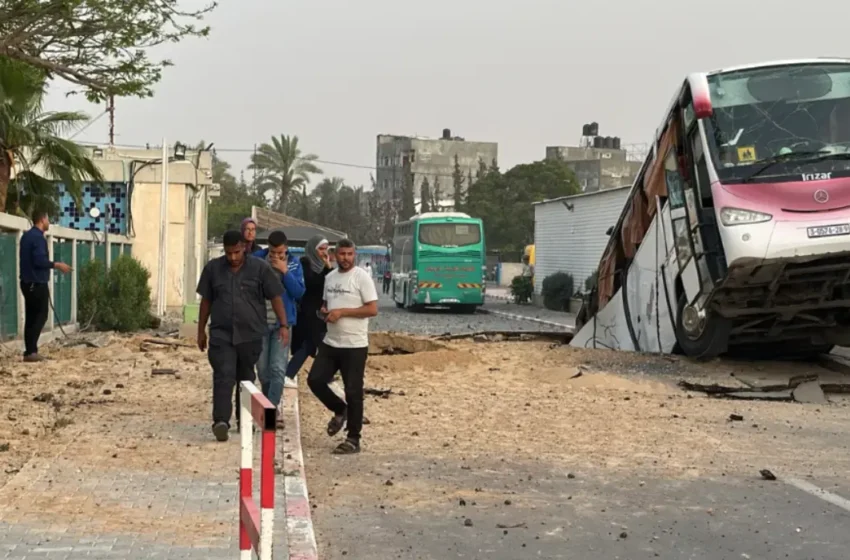
Middle East ( Europe Brief News): Trump-supported Gaza aid sites shut down after fatal shootings left dozens dead at food distribution points, raising international humanitarian outcry.
After a hospital revealed that at least 48 individuals had recently died while attempting to reach an aid facility, the group momentarily halted activities on June 4 and stated that it was discussing protecting civilians with Israel’s military.
Since operations began on May 26, the newly established Gaza Humanitarian Foundation has denied that anyone was hurt, much less killed, at the supply centers.
However, as large numbers of Palestinians make their way to the foundation’s distribution stations, shooting deaths and injuries have increased.
According to IDF spokesperson Effie Defrin, on June 3, Israel’s forces “carried out warning fire” approximately 0.3 miles from the Rafah distribution site, “targeting a few individuals who were approaching in a way that posed a security threat.”
However, there were more fatalities and injuries than “a few.”
Two shootings close to a distribution center in Rafah, southern Gaza, were referred to as “mass casualty” incidents by hospital staff.
According to the International Committee of the Red Cross, which runs the field hospital, medics received 179 injured patients on June 1; 21 of them were already dead.
According to a statement from the ICRC, 184 more wounded people arrived at the Red Cross field hospital on June 3. Of them, 19 were pronounced dead upon arrival, and eight more passed away shortly after.
“Again, all responsive patients said they were trying to reach an assistance distribution site,”
the ICRC said.
Established aid organizations have harshly criticized the Gaza Humanitarian Foundation, claiming that its militarized aid style and strong ties to Israel will endanger civilians.
“Every day, they’re running the risk of a mass shooting,” Refugees International President Jeremy Konyndyk told USA TODAY, referring to the enormous numbers of Palestinians who are walking by armed Israeli soldiers to pick up food.
Accusing Hamas of stealing the goods, Israel shut down all aid entering Gaza for almost three months starting in early March. The Gaza Humanitarian Foundation arrived on the scene as the world community issued a warning about impending mass hunger.
With tall walls and armed guards, the organization promoted its distribution locations as a means of preventing theft while delivering food to Palestinians. Additionally, Israel has long charged that the UN, which used to provide the majority of Gaza’s aid, has anti-Israel bias.
However, because of its connections to Israel, mistrust of the new organization grew among humanitarian workers. Additionally, the charity has come under fire for only setting up four locations in the 2 million-person enclave, requiring Palestinians to trek far to get aid.
Israel accused Hamas of “spreading rumors” and “fake news” that its soldiers were responsible for the June 1 shootings in which terrorists opened fire on people attempting to gather help.
Hamas is “trying bluntly, violently to stop the people of Gaza from reaching those distribution centers,” Defrin said in a video statement.
The U.S. has stood behind its ally.
“It is Hamas that continues to terrorize and intimidate those who seek food aid,”
U.S. Ambassador to Israel Mike Huckabee said in a June 2 statement.
In mid-May, Israel lifted its aid embargo. Only a little amount of aid has reached the people, which is in danger of starvation, according to humanitarian agencies.
The World Food Program and other assistance groups have denied Israel’s accusation that Hamas is stealing aid, claiming that in the midst of the widespread food crisis, hungry civilians have ransacked newly delivered trucks and warehouses.
Following the October 7, 2023, Hamas onslaught that murdered 1,200 Israelis, Israel began its siege of Gaza. Since then, the fighting has claimed the lives of almost 54,000 Palestinians, according to the health ministry operated by Hamas.
What are the implications of the Gaza aid site closures for civilians’ safety?
In the midst of an already dire humanitarian situation, hundreds of Palestinians face delays in receiving necessary food and supplies due to the closure of assistance stations, which will worsen their hunger and suffering.
The Israeli military has deemed the approved access routes to humanitarian stations to be “combat zones,” and previous attempts to deliver aid along these routes have been met with fatal gunfire. Even after places reopen, this makes it unsafe for individuals attempting to receive relief.
In contrast to the former UN system, which had hundreds of dispersed locations, the new assistance delivery system, run by the Gaza Humanitarian Foundation (GHF), depends on fewer centralized facilities and authorized routes. Because of the increased crowding, there is a greater chance of violence and disruption.


